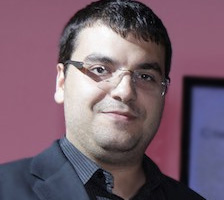Many young people in Bulgaria ask themselves what it takes to start their own business. Start-up income is, of course, the most important thing, followed by a suitable office and a workable idea. But there is one essential thing we tend to forget or underestimate - there is need of people with a good level of financial literacy and the relevant market experience.
Promoting financial literacy is something new to the average Bulgarian school. The experience of countries with market economy traditions shows that teaching entrepreneurship at school and universities affects the business climate. The principle of acquiring knowledge through practice has been implemented for years by the school for entrepreneurs, established in Bulgaria by Junior Achievement – the organization with the oldest traditions in business guidance. The idea is to create teaching programs in financial literacy, conforming with the level and interests of the students. A competence test for people of different ages is now being implemented to this aim. “Financial literacy is not simply a compilation of knowledge, it means practical skills which guarantee young people success in a highly competitive environment," explains Milena Stoicheva, CEO of Junior Achievement in Bulgaria.
 Ivailo Hristov graduated from the school for entrepreneurs of the NGO in 2007. He has been developing his own business ever since and has been successful, and says that he himself is an illustration of the benefits of a thorough knowledge of commerce and markets, starting with the school years.
Ivailo Hristov graduated from the school for entrepreneurs of the NGO in 2007. He has been developing his own business ever since and has been successful, and says that he himself is an illustration of the benefits of a thorough knowledge of commerce and markets, starting with the school years.
Ivailo would like to see more young people as enthusiastic about business as he is. He says that lack of self-assurance is the major stumbling block. Success is attainable and in the shortest term, Ivailo says and adds:
“The program’s greatest asset is the fact that it is practical. Theory cannot provide all the knowledge that an entrepreneur needs. I started back in 2007 with my colleagues from university. We had just a few months to build up a successful company. We decided to create a map with the precise timetables of bus shuttles in Sofia. Bus shuttles were really popular back then, as they were a quicker and more comfortable alternative to public transport to more remote parts of the capital city. The task didn’t seem a complicated one, as we thought we could use online information, but we were astonished to find out that the info was erroneous everywhere we looked. So, to update the routes, we were literally forced to chase each one of the taxis by car. There was a host of problems we had to overcome - coming from advertisers, the taxi companies or loss of patience and motivation within our team. Being a manager of my own company today I face similar challenges in business. Only 50 percent of the staff involved in that university project decided to contine in business. The rest realized that entrepreneurship was not their cup of tea. It is much better to know that before making any investment in somethings you will gain neither money nor satisfaction from. I have two companies behind my back since my graduation – one successful and one unsuccessful. I am now working on a new project. I can make the difference between a workable idea and an unsuccessful one. I am also glad to say that my successful company has over 70 employees with sales across Europe. However, things were very different 5 years ago, business looked tough and precarious. Today when I have classes at university, I try to spur my students to action, as it is practice that teaches us entrepreneurship. It is true that only 5 percent of newly established companies in the world are successful. But where there is a will, one should never consider failure, one should be flexible and make the initial steps into business,” Ivailo Hristov believes.
English version: Zhivko Stanchev
Edited in English by Milena Daynova
On 26 and 27 April, Sevlievo in Central Bulgaria is hosting the festival “Seme Balgarsko ”. For its 11 th edition, the organizers have a colourful traditional lineup. “The festival will enable visitors to meet manufacturers of Bulgarian..
The group cycling tour along the tourist route of the Black Sea Route Epic Tour 2025 started today . According to the extreme sports website 360mag.bg, a group of more than 30 cyclists will spend ten days riding along coastal paths through forests,..
Cambridge Day 2025 - one of the leading events for English language teachers in Southeast Europe - takes place today at the Balkan Hotel in Sofia. For the 19th consecutive year, the conference, organised by Klett Bulgaria Publishing, gathers experts and..
The FameLab International Science Communication Competition aims to discover, train and give a platform to the world’s most promising new scientists. The..
The "Roses of Bulgaria" festival will be held at the Museum of Emigration in Sao Paulo, Brazil on May 10. The cultural event is organized by the..
On May 10 and 11, the interactive science and technology centre "TechnoMagicLand" at Sofia Tech Park will host a national Rubik's Cube speed-solving..

+359 2 9336 661
